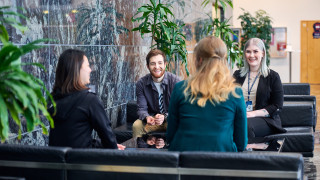Doctoral dissertation: Sustainability education in business schools can be strengthened through practice-integrated learning and cross-sector collaboration

Although sustainable development features more prominently in business school strategies, its integration into everyday teaching often remains superficial. Maija Lähteenkorva’s dissertation shows how educational structures, a market-driven culture, and limited resources make it difficult to embed sustainability in a meaningful and lasting way, often leaving it marginalised or treated as a symbolic, short-term addition to business education.
This is particularly evident in how business curricula are structured. Traditional business models that prioritise profit continue to dominate business school curricula. Meanwhile, alternative forms of organising, such as cooperatives, social enterprises, and employee-owned companies that seek to align business with societal impact, remain largely absent from the classroom.
“When students lack practical experience in implementing sustainability in business and exposure to alternative ways of organising, they may find it more difficult to envision how business could contribute to a more sustainable future”, Lähteenkorva suggests.
Collaborative, hands-on learning makes sustainability learning more tangible
In her doctoral dissertation, Lähteenkorva examines B Corp courses as a form of practice-integrated learning, where students work with certified B Corporations, businesses that combine profit goals with social and environmental responsibility. Through these courses, students gain practical tools to tackle real sustainability challenges and experience first-hand the complexity of making business decisions that balance people, planet, and profit.
The research shows that these courses can help challenge or reframe existing educational norms, bringing sustainability more firmly into everyday classroom practice. Practice-integrated learning not only provides knowledge about sustainability but also supports the development of students’ sustainability mindset and their capacity to act. Cross-sector collaboration with alternative organisational forms also introduces new actors, perspectives, and resources into the classroom, enriching the learning experience and broadening the scope of business education.
“In a world urgently seeking sustainable solutions to global challenges, crucial to consider what kind of knowledge and capabilities higher education is building. My dissertation highlights that education can be more than just a reaction to societal change—it can serve as an active tool for transformation, shaping the values and practices that will define the business world of the future”, Lähteenkorva says.
Additional information:
M.Sc. (Econ.) Maija Lähteenkorva will defend her doctoral dissertation in Corporate Environmental Management “Breaking Barriers: Insights into Integrating Sustainability in Business School Curricula through B Corp Collaboration” on Wednesday 28 May 2025 at 14:00 at the University of Jyväskylä. The event can be attended in person in Lea Pulkkinen Hall (Ag B431.1) or online.
The opponent is Professor Martin Fougère (Hanken School of Economics) and custos Senior Lecturer Stefan Baumeister (University of Jyväskylä).
The public defense is held in English.
Watch the dissertation event through remote connections (Zoom).
Take a look at Maija Lähteenkorva's dissertation.





